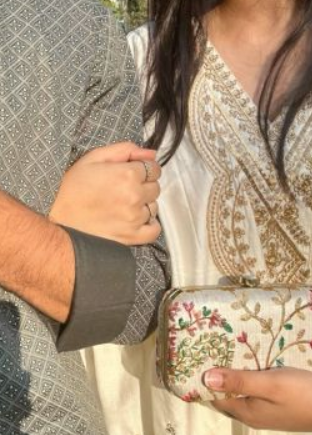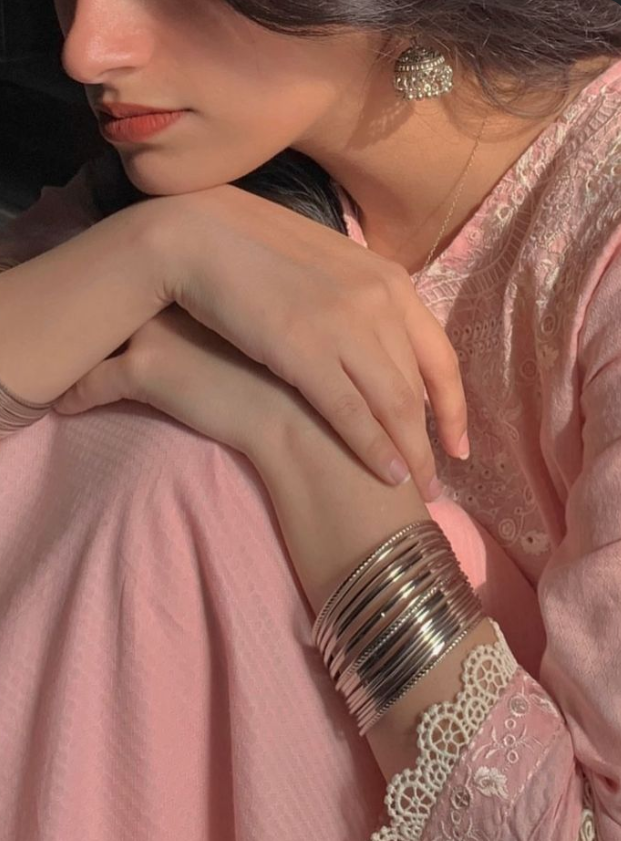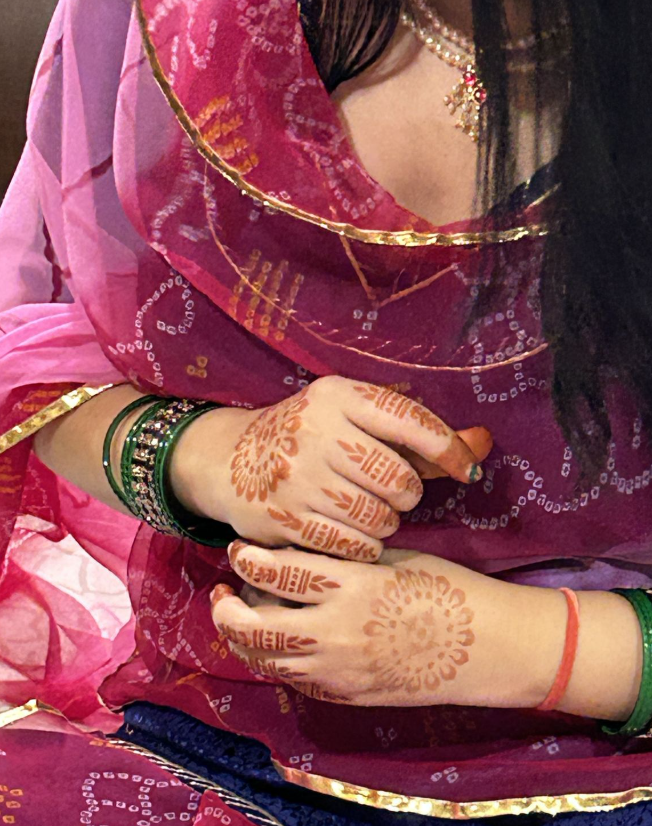
Avisha never knew where she came from. No birthdays celebrated, no photos from childhood, no stories about her first steps or the silly things she said as a toddler. Just a name someone gave her, and the silence that came with being an orphan.
She grew up in a shelter that was neither cruel nor warm—it was just... there. Life wasn't easy, but she had a quiet strength about her, the kind that comes from having no one to fall back on. She didn't complain, didn't expect much. She learned early how to rely on herself.
When she got a scholarship to study at a good school, it felt like a second chance. She was nervous, awkward, and unsure of how to fit in. But slowly, people started to notice her. Not because she tried to stand out, but because there was something graceful about her. Her beauty wasn't loud—it was the kind you didn't forget once you noticed it. Soft eyes. A gentle smile. A presence that felt safe.
That's when Manisha walked into her life. Loud, full of life, and totally unbothered by what people thought. Manisha was everything Avisha wasn't—but somehow, they clicked. She became Avisha's best friend. The first real friend. They ate together, teased each other, stayed up late before exams, and laughed till their stomachs hurt. With Manisha, Avisha finally felt like she belonged somewhere.
But life has a strange way of testing you.
Rumors started. Whispers about Avisha's background, questions about where she came from. Some said she was hiding something. Others just made things up. And somewhere in that mess, Manisha doubted her—even if just for a moment. She didn't say it outright, but Avisha felt the change. The hesitation. The step back.
It hurt more than she expected.
But Avisha didn't fight. She didn't explain. How could she, when she barely knew the truth herself? So she just smiled like always, and quietly stepped back.
That's who Avisha was—kind, even when it wasn't returned. Strong, even when she felt like breaking. She didn't have answers about her past, but she knew who she was becoming. And maybe that was enough.
She still loved deeply. She still believed in friendship, even after being left alone. Because despite everything, she hadn't let the world make her bitter.
And in that, she was extraordinary.

Manisha
Manisha came from a well-off, upper-middle-class family. A clean, spacious home where the fridge was always full, her mother insisted on weekend family dinners, and her father treated her like a queen. But Manisha never carried that background like a badge. She was down-to-earth, never once showing off or making anyone feel less than her.
What made her stand out wasn't money or style—it was her energy.
Manisha was the kind of girl who could turn a boring classroom into a scene of laughter. She was witty, sharp, and just the right amount of naughty. She'd pass notes during lectures, pull light-hearted pranks on teachers, and tease her friends with a sparkle in her eyes. People were drawn to her because she made everything seem more alive.
She had an elder brother who was ridiculously overprotective. He'd check on her even during recess sometimes, always reminding her to stay away from "useless boys." Manisha found him annoying, but deep down, she loved that he cared. They fought often, but he was the one she always called when she felt low.
But perhaps the best part of her day was gossiping with Abhishek—her trusted gossip partner. They'd sit under the big tree near the school canteen or walk around the corridors, laughing at the latest school drama. Who's dating who, who failed the test, who wore what—nothing escaped them. Abhishek was her dose of daily drama, and together, they made the world feel a little lighter.
Manisha had a strong sense of loyalty. When she loved someone—friend or family—she gave her whole heart. That's what made her friendship with Avisha so real. Even though they came from different worlds, she never treated Avisha any differently. She found comfort in Avisha's calmness, and Avisha found courage in her chaos.
Manisha was sunshine. Unfiltered, unapologetic, and deeply human.

Aarav
Aarav was the kind of man who didn't say much—but when he did, people listened.
He had the sharp mind of a businessman. Calm under pressure, practical in approach, and always thinking five steps ahead. Whether it was sealing a deal or managing a crisis, Aarav handled it with quiet confidence. But underneath that composed exterior was a heart that cared deeply—especially when it came to his family.
He had a soft spot for his younger sister, Manisha. She was the wild wind in his structured world. Her jokes, her messiness, her endless chatter—it all drove him crazy, but he wouldn't trade it for anything. He watched over her like a shadow, often overprotective, sometimes strict, but always out of love. Manisha called him bossy; he called it being responsible.
But here's the thing about Aarav—he struggled with emotions.
He wasn't the kind to say "I love you" or give warm hugs. Not because he didn't feel those things, but because he didn't know how to express them. To him, showing emotions felt like standing unarmed near a shark—risky, exposed, dangerous. So, instead of words, he showed love through actions. He'd wait outside Manisha's college during late-night events. He'd remember how she liked her tea. He made sure the house felt safe when their parents weren't around.
He had a kind heart—one that quietly carried the weight of everyone's problems but never asked for help with his own. People misunderstood him often, thought he was too serious or too reserved. But those who really knew Aarav understood that he was the anchor—the one who made sure the family stayed steady no matter what storms came their way.
Aarav didn't need to say much. His silence said it all.

Siddhi
Siddhi was the eldest cousin in the family—the one who walked like the world owed her a little more than the rest.
She grew up in the same house as Aarav and Manisha, but her outlook on life couldn't have been more different. While the family valued simplicity, warmth, and togetherness, Siddhi believed in maintaining a certain "standard." For her, life was a ladder—and she was always climbing, making sure she stayed at least a few rungs above everyone else.
Oddly enough, Siddhi always said she came from a middle-class, lower-middle-class background. But she carried herself like she belonged to a high society. Her tone, her expressions, even the way she chose her words—it all reflected a sense of entitlement. She believed some people were just "meant" to lead, and others to follow. Equality, to her, was a myth romanticized by the weak.
She wasn't evil. But she was arrogant, blunt, and often made others feel smaller—without even trying. Her presence brought silence to a room, not out of respect, but out of discomfort. She judged people based on their clothes, their way of speaking, even how they held a cup of tea. And she always made sure her opinion was heard, even if it hurt.
Aarav tolerated her out of family obligation. Manisha mostly rolled her eyes and ignored her. But Siddhi didn't care. She believed that emotions were for fools, and survival in society came from projecting superiority, not connection.
Despite living in the same home, Siddhi never blended in. She stayed slightly detached, slightly above—always watching, always calculating.
For Siddhi, life wasn't about harmony—it was about hierarchy.




Write a comment ...